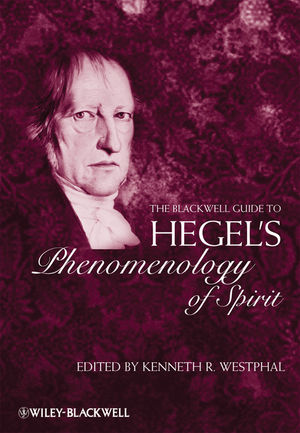The Blackwell Guide to Hegel's Phenomenology of SpiritISBN: 978-1-4051-3109-4
Hardcover
368 pages
January 2009, Wiley-Blackwell
 This is a Print-on-Demand title. It will be printed specifically to fill your order. Please allow an additional 15-20 days delivery time. The book is not returnable.
Other Available Formats: Paperback
|
||||||
“This collection of essay is an invaluable guide to Hegel’s Phenomenology of Spirit for graduate students and Hegel Scholars. As well as being a lucid and detailed commentary on the entire of the Phenomenology of 1807, it also offers original contributions, which on certain occasions challenge traditional interpretations or the received view.” (Evangelia Sembou, The Owl of Minerva, 1 November 2012)
"This collection reunites the leading experts on Hegel's philosophy who systematically address key issues in the notoriously difficult Phenomenology of Spirit. In every chapter the authors accompany the unfolding of Hegel's argument and guide the reader through the intricacies of dialectical transitions." (CHOICE, August 2009) "A very impressive collection of essays by some of the most acute readers working on Hegel today. ... The essays in this volume provide many accessible points of entry into Hegel's thought. Scholars and teachers of Hegel's most rewarding and perplexing work should be grateful." (Notre Dame Philosophical Reviews, December 2009)
"This is an impressive collection of papers, covering the Phenomenology in sequence. The authors provide much enlightenment on this difficult text, often shedding new light on well-known problems of interpretation and philosophical understanding. This makes it an extremely welcome addition to the burgeoning literature on Hegel's philosophical masterpiece." –Robert Stern, University of Sheffield"This is an invaluable resource for anyone attempting to come to terms with Hegel’s Phenomenology of Spirit. The reader of Hegel’s classic work is supposed to journey through a series of shapes of consciousness and spirit in a way that is not meant to be governed by some single, mechanically imposed, overarching point of view. By having a series of leading Hegel “guides,” each of whom illuminates one of the stages of the journey, The Blackwell Guide is able to capture the type of organic transitioning that characterizes the work itself." –Paul Redding, University of Sydney



